Geeks7 teams professional services SEO services make yourself visible on the first page of Google search results. You will therefore be able to find customers who are looking for the goods or services you offer. This requires a professional SEO optimisation.
Read more at
SEO optimisation
SEO optimisation has two parts:
- Internal to the website or e-shop SEO optimisation
- External optimisation (references/authority)
Internal SEO optimisation - fixing/adapting/expanding/improving the website itself to meet Google's various recommendations. Filling it with quality and detail content/text, installing and configuring the necessary plugins, etc. Google is constantly releasing new optimisation guidelines, so it's essential to keep up to date with the latest technological developments.
External SEO optimisation - is a permanent boost to your website's online authority, which is achieved by publishing on news portals, blogs and online magazines.
Benefits of SEO optimisation
An optimised web page will allow to be visible on the first page of search engine results for the keywords you want to use (keywords). Why? Because Google considers optimised pages to be of high quality and to meet its search criteria. Plus, Google advertising for optimised pages is significantly cheaper, which we suggest you take advantage of to get customers right away.
- Only one in two visitors look at the second page of search results, while only a few percent of people look at the third page
- Getting visitors is only possible with proper and quality optimisation and a top ranking on the first page of search results
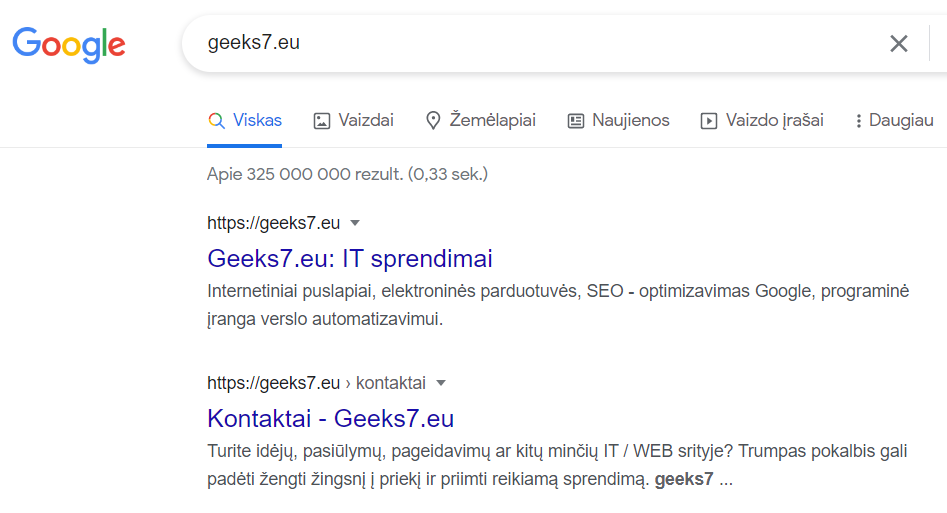
Difficult to decide or don't know where to start? Take the first step - contact us by phone (call or SMS / WhatsApp / Viber) +370 644 07000, by e-mail info@geeks7.eu or submit request. We will assess and propose the optimal option that best meets your needs and expectations.
Benefits of SEO services

Constant flow of customers. Customers will find you on the first page of results.

A clearly measurable outcome. Enter the keywords you want to use and you will see yourself among the results.

Relatively inexpensive advertising. Compared to other forms of advertising, it's really not expensive.
How is SEO optimisation done?
SEO services - price
The cost of the project consists of two parts.
The first part is a one-off fee. For this fee, your website is then fixed according to the results of the SEO audit for maximum relevance. Google guidelines. The price depends on the current status, the number of keywords and their competitiveness on the market.
The second part is the monthly fee. For this fee, not only is external SEO done, but the aim is to maximise the number of external authoritative and quality links and to strengthen the page's authority on the internet. But also the further adaptation of the website to changing requirements, as Google continuously updating and expanding its recommendations for websites. The cost of this part depends on the desired results, the competitiveness of the keywords and the current situation.
Keywords for low competitiveness
From 180€
/ month.
- Clear and detailed monthly report
- Execution of a pre-established strategy
Keywords for high competitiveness
From 360€
/ month.
- Clear and detailed monthly report
- Execution of a pre-established strategy
Prices exclude VAT (21%).
Difficult to decide or don't know where to start? Take the first step - contact us by phone (call or SMS / WhatsApp / Viber) +370 644 07000, by e-mail info@geeks7.eu or submit request. We will assess and propose the optimal option that best meets your needs and expectations.
20 Google ranking factors (updated 2024)
No one knows exactly how Google's algorithm works, except for a limited number of Google employees. However, many of the ranking factors (ranking factors) that influence your page to be ranked higher in searches, we can highlight. It is through our SEO services that we strive to ensure that your page matches these factors as closely as possible. This list is updated and adjusted over time as Google continually updates and improves its algorithm to adapt to rapidly evolving technologies. SEO services are therefore not a short-term activity. It is a continuous and never-ending process of keeping up with SEO news and optimisation.
How were these SEO factors identified?
- According to the official Google web development recommendations (Google Search Essentials / Webmaster Guidelines)
- Additional clarifications/clarifications by official Google representatives in various presentations at conferences and on social media accounts (Twitter, etc.)
- Through dedicated research and years of experience
Many of these factors are official and proven, but some are controversial or simply highly unlikely by IT professionals. Factors that influence the results are called ranking signals (ranking signal).
To begin with, we can divide all classification factors into 9 categories:
- Domain
- Page
- Websites
- External links
- User interactions
- Google Specials
- Brand signals
- Website spam signals
- External link spam signals
Domain factors
- Domain age. While many SEOs believe that older domains are more trusted by Google, Google's John Mueller has said that "domain age helps nothing" i.e. the age of the domain has no influence.
- A keyword in a domain name. In the past, this had a significant impact, but now it is minimal. It is therefore considered a low classification signal.
- Domain expiry date. According to Google, domains that are used for spam are rarely renewed for more than a year. Therefore, the expiry date of a domain can be considered a low ranking signal.
- Keyword subdomain. For example. kaunas.geeks7.eu subdomain would be Kaunas. To this end, Moz conducted a study and found that using a keyword in a subdomain improves Google ranking.

5. Domain re-registrations. If a domain has undergone many changes of ownership, or has been de-registered and re-registered, even by the same owner, Google may re-rank the domain and disregard the influence of prior authority or external links. However, in some cases, if a domain has been penalised for certain infringements, the bad authority of the page is transferred to the new owner. Therefore, once you have chosen a name you like, it is essential to first domain check.
6. Exact match domains (EMD). This is just a low-level ranking signal (like a subdomain).
7. A top level domain (TLD) extension. A domain extension, otherwise known as a top-level domain, e.g. .lt / .eu / .com / .lv has an impact on the SEO ranking in a particular country, but this limits the domain's ability to rank globally.
Page factors
8. Title tag. Seniau name tag was a particularly important SEO factor. Now its influence has been significantly reduced to a medium level. It has been observed that if a title starts with a keyword, it also has a positive impact on SEO results.
9. Keywords in the description tag. Google does not use the description tag as a direct ranking signal. However, a well-written title will entice a potential customer to choose your result over your competitor's in a Google search, i.e. it will improve the click through rate (CTR). This is a very important ranking factor.
10. Keyword in the main heading (H1 - heading 1). The H1 tag (main heading) is the second position of the page title. Google uses it as a secondary signal of a page's relevance.
11. The number of repetitions of a keyword in a text. Google uses special algorithms to do this. The most primitive version is the long-established TF-IDF (term frequency - inverse document frequency). However, Google uses a much more developed and modernised a text perception algorithm.
12. Scope of content. Larger text tends to be much more detailed on a given topic, and is therefore preferred by the search engine. Short texts tend to be only superficial and rank lower. From study it was found that pages with 1,400 words appeared on the first page of Google search results.
13. Table of contents. Not only does the content of a page with links help the search engine to better understand what the page is about, but it also improves the user experience, which leads to better page statistics, which in turn significantly improves SEO results. In addition, content is often displayed in search results as additional website links, which improves the aforementioned CTR.
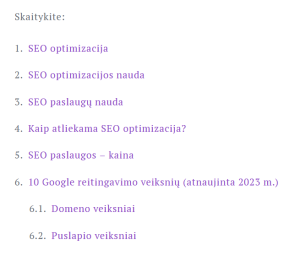
14. Semantically related keywords (LSI - Latent Semantic Indexing Keywords). For example, for the keyword "car", the LSI keywords could be "car", "engine", etc. Because machine can have more meanings e.g. "sewing machine". It is believed that the use of LSI keywords in the text allows Google to determine the true meaning of the keyword. But it is likely that the search engine uses much more sophisticated algorithms to understand the content and the true meaning, because according to Google's John Mueller - LSI keywords do not exist.
15. The theme of the page is particularly thorough. The study found a strong correlation - higher Google search results are related to the full content of the page.
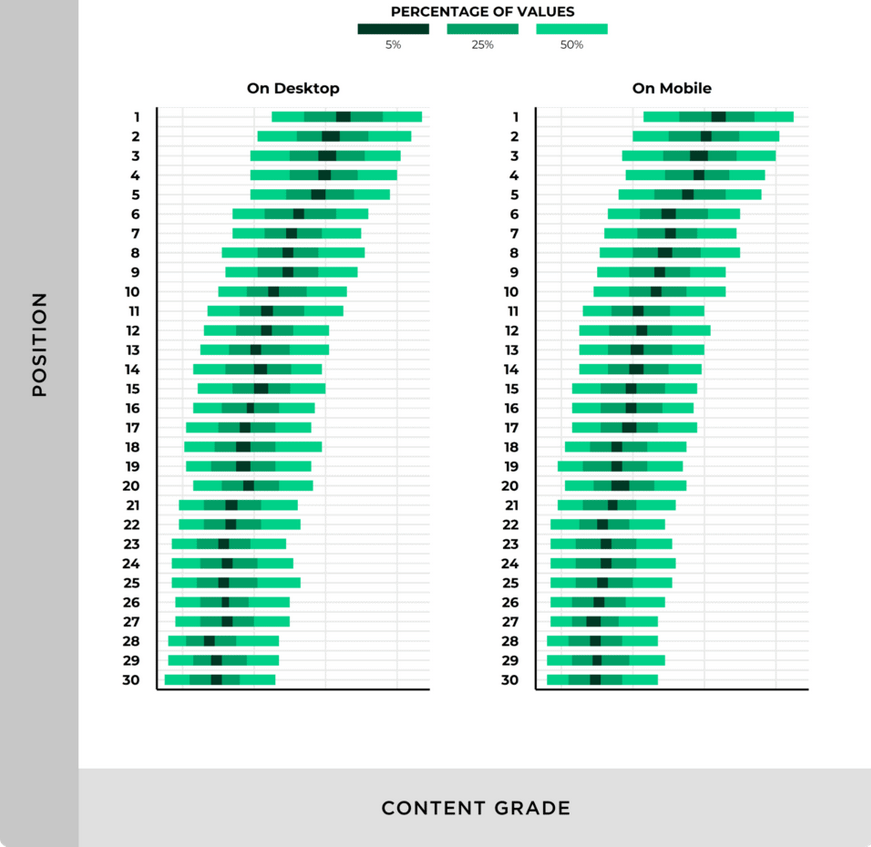
16. Page load speed. Google uses real data about the page, measured by the experience of users who have used Chrome. It also provides a page speed measuring toolwhere the data can be both theoretically measured and actually collected through user experience. In addition, SEO optimisation recommendations and evaluation are provided. Although it is claimed that this is a ranking factor, it is likely to be a very minor one, as studies have shown no correlation between page speed and position in the results. It should be noted that there is no need to try to optimise page 100%, as the various effects, photos and videos particularly detract from that ranking. It is always necessary to compromise and try to rank higher than 75%.
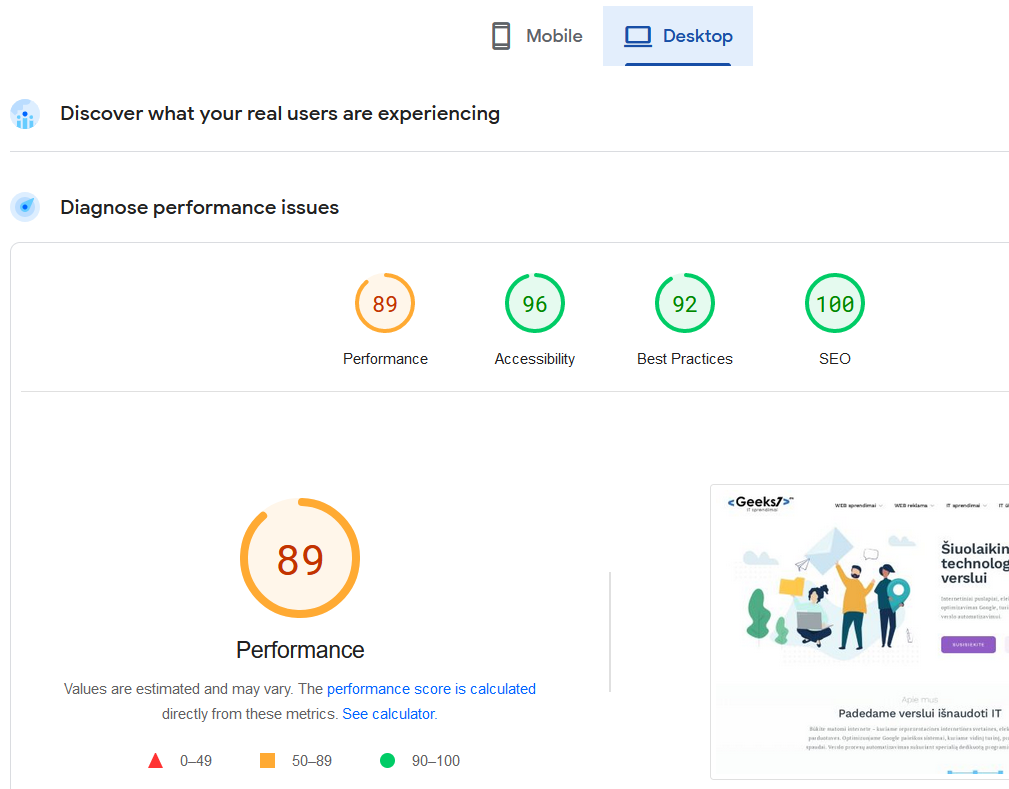
17. Keyword in lower level headings. The ones like H2, H3, H4, etc. are not significantly affected. According to Google's John Mueller: "Headings simply help you understand the structure of the page itself.„
18. Outgoing links. Such references shall a positive effect on Google rankingwhen they are of high quality and relevant to the content.
19. The length of the page address (URL). It has no impact on Google's ranking, as long as it is not too long. However, addresses that are too long have a negative impact on rankings. SEO experts have found a correlation between the length of an address and its position in search results.
Site factors
20. Contact information. Google's SEO guidelines state that it prefers pages with detailed contact information.
21. Unique and high quality content. Every website needs to bring something special and unique to the table. Websites that do not provide original content are completely unranked by Google's algorithm and do not appear in search results, even on the last few pages.
22. Constantly updated content. According to Google, it is no ranking signal. However, by continuously adding and updating articles/pages, there is a better chance of creating unique useful and valued content, which is one of the most important ranking factors.
23. Sitemap. Undoubtedly, the site schema enables robots to index/understand the site more fully and accurately. However, The site schema is not a Google ranking signal.
24. A permanent website. If a website is only down for a short period of time, it does not affect the ranking. However, if the downtime is prolonged and repeated frequently, it can lead to both a drop in search results and a complete de-indexing from search.
25. SSL certificate. According to Google, this is a tiebreaker Ranking signal.
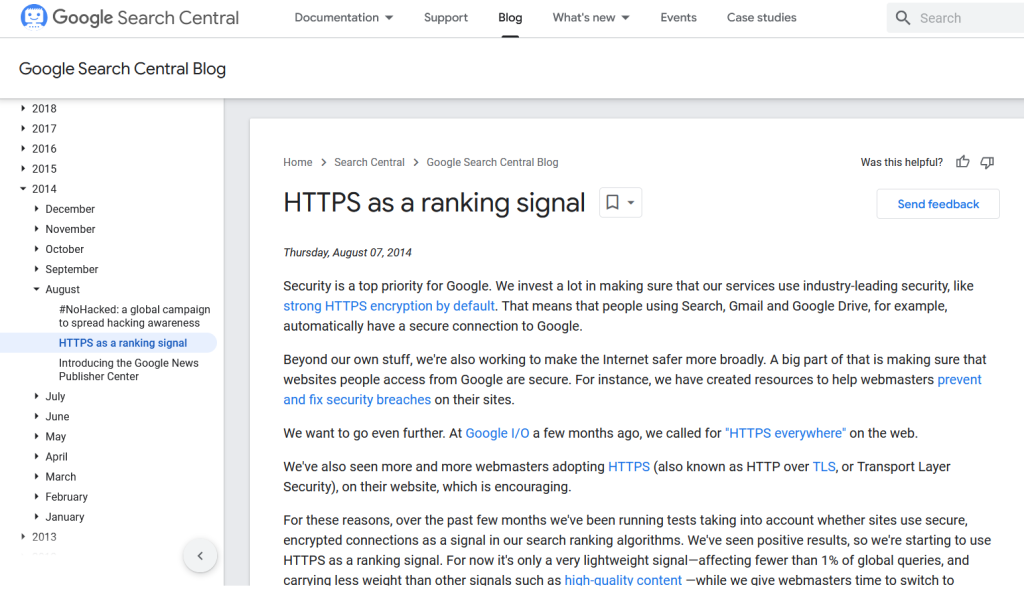
26. Breadcrumbs. According to Google, this is not a direct ranking signal, but it is a sign of a quality websitefor easier user navigation. However, as already mentioned, a quality website is a ranking signal.
27. Mobile optimisation. As more than half of searchers use a mobile device instead of a computer, different search results are ranked differently for different devices. If a website is not optimised for mobile phones, it will have a strong negative impact on its ranking in the results when searched from a phone.
Frequently asked questions
SEO Search Engine Optimization - search engine optimisation. The more detailed the content of a website and the better optimised the website itself, the higher it appears in Google search results.
SEO Search Engine Optimization - search engine optimisation.
SEO services spend years optimising your website for search engines, with the aim of getting it to appear as high as possible in search results.
SEO optimisation is the process of organising your website according to Google's recommendations.
Various Google and third-party tools are used for SEO auditing and analysis. Google PageSpeed Insights, Google Search Console, Google Analytics, Ahrefs, Moz and others. They can help us find out if a website is out of line with Google's recommendations, external links, detailed traffic statistics, placement in search results for various keywords, and other metrics needed to provide quality seo services.
The price of SEO services depends on the competitiveness of the keyword and the number of keywords.For low-competitive keywords, the preliminary price is 180-360 EUR. In all cases, the price is determined after a free SEO audit.
SEO is often part of a company's success story. It is only through quality SEO services that companies' services and products are found in the search results of their customers.
All our websites are SEO-ready (seo friendly). We build all our pages based on SEO recommendations.
Geeks7 SEO audits for existing and potential clients are free. Simply complete the service request, email or call.
